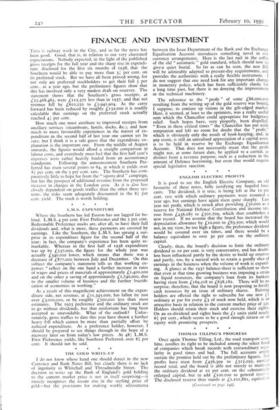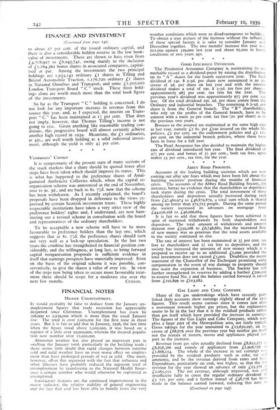THOMAS TILLING'S PROGRESS
Once again Thomas Tilling, Ltd., the road transport com- bine, justifies its right to be included among the select band of companies which break records with extraordinary regu- larity in good times and bad. The full accounts arnriY sustain the promise held out by the preliminary figures. Net profits have risen from £456,399 to £512,195, another record total, and the board is able not merely to maint.iin the ordinary dividend at 10 per cent. on the substantially enlarged capital, but to add £100,000 to general reserk The discloseddisclosed reserve thus stands at £1,101,861, equivalent
(Continued on page 242)
FINANCE AND INVESTMENT
(Continued from page 240) to about 27 per cent. of the issued ordinary capital, and thcre is also a considerable hidden reserve in the low book- value of investments. These are shown to have risen from £4,708,927 to £6,045,741, owing mainly to the inclusion of £1,164,362 bonus shares in associated companies, capital- ised at par. Among the investments the two principal holdings are 1,933,142 ordinary Li shares in Tilling and Bristol Automobile Traction, 1,176,720 ordinary Lx shares in National Omnibus and Transport, and some £1,500,000 London Transport Board " C " stock. These three hold- ings alone are worth much more than the total book figure of the investments.
So far as the Transport " C " holding is concerned, I do not look for any important increase in revenue from this source this year, and, as I expected, the interim on Trans- port " C" has been maintained at t-} per cent. That does not imply, however, that Thomas Tilling's income is not going to rise. Given anything like reasonable trading con- ditions, this progressive board will almost certainly achieve another high record in 1939. Meantime, the Lx ordinaries, at 45s., are well worth holding as a solid industrial invest- ment, although the yield is only 41- per cent.















































 Previous page
Previous page